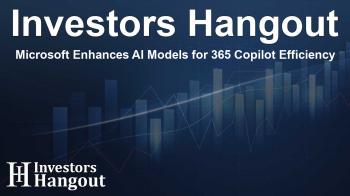Microsoft Enhances AI Models for 365 Copilot Efficiency

Microsoft’s Innovative Approach to AI in Microsoft 365 Copilot
Recently, Microsoft (NASDAQ: MSFT) has taken strides to diversify its artificial intelligence capabilities, particularly within its Microsoft 365 Copilot product. This move involves integrating various internal and third-party AI models, allowing Microsoft to extend its functionality and improve performance.
Reducing Dependency on OpenAI
Historically, Microsoft has been a prominent supporter of OpenAI, but recent reports suggest a strategic shift. The tech giant aims to minimize its reliance on OpenAI's technology for 365 Copilot, driven by concerns over costs and operational speed for enterprise applications.
Strengthening In-House Development
In its efforts to enhance 365 Copilot, Microsoft has been investing in training its own models, including its newest Phi-4 model. By customizing open-weight models, the company aims to boost the efficiency and performance of its services while reducing operational costs.
Benefits for Enterprise Users
This diversification strategy not only aims to reduce costs for Microsoft but also has the potential to translate these savings into benefits for its end users. By developing and employing AI models that are more adaptable and cheaper to run, Microsoft hopes to enhance the overall customer experience.
Continued Collaboration with OpenAI
While Microsoft is actively working on its proprietary models, it is important to note that OpenAI remains an essential partner. A company spokesperson emphasized that the collaboration continues, particularly regarding frontier models, which are some of the most advanced AI technologies available. Microsoft retains the ability to modify these models to suit its needs.
The Future of AI in Microsoft Products
Microsoft's dedication to enhancing its AI strategies shows its commitment to leading the tech industry. With the ongoing innovation in AI technology, the company is positioning 365 Copilot as a vital tool for businesses aiming to leverage AI effectively.
Frequently Asked Questions
What is Microsoft 365 Copilot?
Microsoft 365 Copilot is an AI tool designed to enhance productivity by assisting users with tasks in various Microsoft applications.
How is Microsoft reducing its reliance on OpenAI?
Microsoft is diversifying its AI models by training its own technologies and incorporating third-party solutions to reduce dependence on OpenAI services.
Who is involved in the development of AI models for 365 Copilot?
Microsoft has been focusing on internal development while still collaborating with OpenAI for advanced models.
What are some benefits of the new AI models?
The new models aim to improve speed, efficiency, and reduce costs, which could lead to better service for enterprise users.
What is the significance of the Phi-4 model?
The Phi-4 model represents one of Microsoft's latest advancements in AI, designed to enhance the functionality of the 365 Copilot product.
About Investors Hangout
Investors Hangout is a leading online stock forum for financial discussion and learning, offering a wide range of free tools and resources. It draws in traders of all levels, who exchange market knowledge, investigate trading tactics, and keep an eye on industry developments in real time. Featuring financial articles, stock message boards, quotes, charts, company profiles, and live news updates. Through cooperative learning and a wealth of informational resources, it helps users from novices creating their first portfolios to experts honing their techniques. Join Investors Hangout today: https://investorshangout.com/
Disclaimer: The content of this article is solely for general informational purposes only; it does not represent legal, financial, or investment advice. Investors Hangout does not offer financial advice; the author is not a licensed financial advisor. Consult a qualified advisor before making any financial or investment decisions based on this article. The author's interpretation of publicly available data shapes the opinions presented here; as a result, they should not be taken as advice to purchase, sell, or hold any securities mentioned or any other investments. The author does not guarantee the accuracy, completeness, or timeliness of any material, providing it "as is." Information and market conditions may change; past performance is not indicative of future outcomes. If any of the material offered here is inaccurate, please contact us for corrections.
